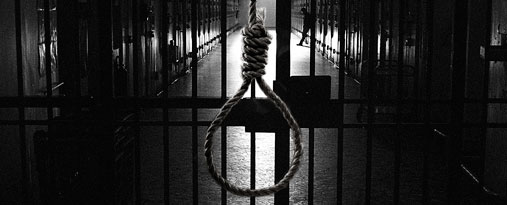The following is an interesting editorial snagged from the Barbados Advocate.
 An item in the Barbados Advocate on Wednesday informed that the current governing Jamaican administration is considering a return to hanging, by which we understand that it is contemplating, after a self-imposed moratorium, the carrying out of the death penalty as punishment for the offence of murder. The headline to the report also indicates that the official Opposition is against this initiative.
An item in the Barbados Advocate on Wednesday informed that the current governing Jamaican administration is considering a return to hanging, by which we understand that it is contemplating, after a self-imposed moratorium, the carrying out of the death penalty as punishment for the offence of murder. The headline to the report also indicates that the official Opposition is against this initiative.
Given Jamaica’s embarrassingly high murder rate, and the propensity of regional electorates to believe that every problem has a political cause and solution; it is understandable that an administration would seek to carry out the death penalty -which remains on the statute books of most regional jurisdictions-, to demonstrate its toughness on crime in general and murder in particular. At the same time, it is equally understandable, at least from a partisan political point of view, that the Opposition would oppose this venture lest it should prove successful and provide immediate political capital to the governing administration. We have seen it time and again; most recently in Trinidad & Tobago where, because of the configuration of seats in the Lower House of Parliament, no Opposition support was forthcoming for an administration that sought like Jamaica, to re-introduce capital punishment.
According to the Minister of National Security in Jamaica, Mr Robert Montague, he has instructed the Minister of State in his ministry to “consult with several stakeholders to determine if there are any legal impediments to be addressed. With due respect, it is clear that Mr Montague is not yet familiar with comparatively recent legal developments in his own country and elsewhere that have served effectively to put an end to any probability of capital punishment being carried out in the region or Jamaica for some time to come.
For one, Jamaica already makes a distinction between two categories of murder; capital murder which carries a sentence of death by hanging, and non- capital murder which renders the perpetrator liable to life imprisonment with a minimum term to be served before parole. Capital murder involves those cases where the victim is a specified individual –police and correctional officers; judges; witnesses; and prosecution counsel; and those instances where the murder was committed in the course of a rape, robbery, burglary or an act of terrorism or where the killing was a contract killing or “hit”. All others are non-capital.
Second, it was the decision of the Judicial Committee of the Privy Council on appeal from Jamaica itself in Pratt &Morgan [1993] that severely limited any prospect of capital punishment in the region. Here, their Lordships ruled that the execution of a convicted murderer five years or more after sentence would be cruel and inhuman punishment and therefore unconstitutional.
This decision should have lit a fire under those administrations that were desirous of carrying out the death penalty to speed up the post-sentencing process, but a combination of inherent sloth in the judicial system and the unhurried nature of proceedings in the human rights committees have put paid to any likelihood of the five-year rule ever being complied with.
Moreover, Jamaica acceded to the American Human Rights Convention in 1978 and Barbadians are well aware of that Convention’s take on capital punishment as interpreted by the Inter-American Court of Human Rights [IACHR]. The court has ordered Barbados to amend its Constitution and to remove the mandatory death penalty for murder as it is in violation of Art.2 of the Convention that requires State Parties to legislate so as to assure the rights guaranteed under the Convention, including the right to life.
Mr Montague will hear all this in due course, we expect.





The blogmaster invites you to join the discussion.